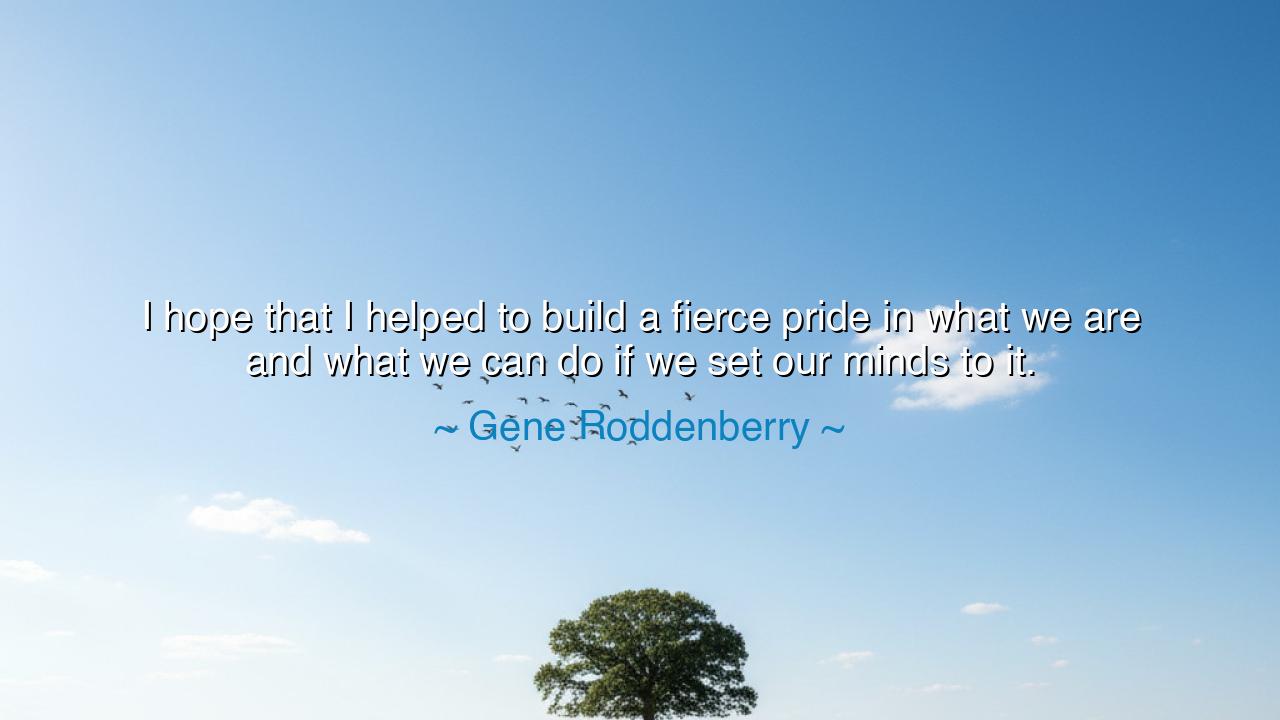
I hope that I helped to build a fierce pride in what we are and
I hope that I helped to build a fierce pride in what we are and what we can do if we set our minds to it.






In the councils of dreamers and builders, hear Gene Roddenberry speak a gentle, steel-spined vow: “I hope that I helped to build a fierce pride in what we are and what we can do if we set our minds to it.” In one breath he names the substance of courage—pride not as vanity but as a clean fire—and weds it to the discipline of human purpose. The sentence sounds like a benediction over a launchpad: we are more than our fractures; together we can go farther than our fears. It is the creator’s prayer that the story he cast upon the stars would return to earth as dignity and resolve.
The meaning is double. First, fierce pride in what we are refuses shame about the human condition. It insists that our species, for all its folly, is capable of reason, compassion, and discovery—worthy of self-respect without self-idolatry. Second, what we can do if we set our minds to it names the old discipline: attention, cooperation, long patience. Roddenberry’s creed is not daydream but marching order. The future, he suggests, is built by the stubborn joining of minds around goods larger than appetite—justice, knowledge, and friendship across real difference.
As to the origin, the line is preserved in established anthologies of Roddenberry quotations and matches the spirit that pervades his public remarks—an unabashed humanism that hoped his work had nudged people toward confidence and competence. Read alongside his other avowals (that the “human adventure is just beginning,” or that Star Trek sought to show us what we might become), the sentence is less a stray epigram than a concise statement of his life’s project: to dignify humanity and to summon it to concerted action.
A story makes the vow visible. In the 1960s, Nichelle Nichols—poised to leave Star Trek for Broadway—met Martin Luther King Jr., who urged her to stay: her presence as Uhura showed the world a Black woman whose competency and command were simply assumed. Representation became a lever; pride, a public good. She remained, and millions saw on weekly broadcast what we are and what we can do together. Roddenberry’s hope gained flesh: a fiction that taught a truer fact about human possibility.
The ancients would say that a people becomes what it honors. Roddenberry offered a cosmos that honored curiosity over conquest, diplomacy over dominance, and diverse crews over tribal suspicion—the Vulcan IDIC of “infinite diversity in infinite combinations” translated into starship practice. Such honor shapes habit: when young minds are invited to take fierce pride in cooperation, they learn to treat difference as raw material for invention, not a pretext for fear.
Yet the line also contains a personal ethic. Hope is not a mist; it is a craft. It asks each of us to add one precise dowel to the ark—one study session, one repaired friendship, one vote, one line of code that serves the common good. “What we can do” is plural—no captain without crew, no breakthrough without the unglamorous grind. Thus the sentence rebukes both cynicism (which shrinks the soul) and apathy (which empties the hands). It invites courage that is contagious.
What, then, shall we take as rule? First, practice fierce pride rightly: name three things daily that humans have done to lift the world (a vaccine, a poem, a bridge)—and add one act to that ledger yourself. Second, set your mind: choose a hard, good goal and break it into weekly pledges; let accountability be your warp drive. Third, widen the “we”: build tables that seat difference, for ingenuity flourishes where perspectives braid. Fourth, nourish imagination: read and watch stories that enlarge the possible, then translate one imagined virtue into a real habit.
Carry Roddenberry’s cadence like a pocket star: hope, fierce pride, what we are, what we can do, set our minds. Let it stiffen your spine when news darkens, and soften your heart when pride curdles. For the lesson is simple and heroic: believe that humanity is worth the wager—and behave as if your day’s labor tips the scale. If his stories helped kindle that belief, then the creator’s hope is fulfilled; if we live by it, the future he sketched will keep arriving, one determined mind at a time.






AAdministratorAdministrator
Welcome, honored guests. Please leave a comment, we will respond soon